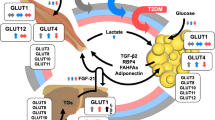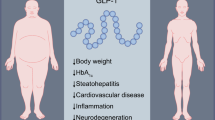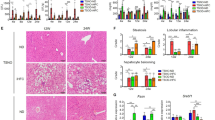Abstract
Background
We evaluated metabolic changes after vertical sleeve gastrectomy (VSG) surgery in a rat model using proteomics and metabolomic profiling in liver and serum.
Methods
Rats were randomly divided into two groups: sham (n = 10) and VSG (n = 12). Food intake, body weight, blood glucose, insulin, and thyroid hormone levels were measured. Two-dimensional electrophoresis, nuclear resonance spectroscopy, mass spectroscopy, immunofluorescence, and immunoblot analyses were used to determine and validate changes in metabolites and proteins in liver tissue and serum samples.
Results
Food intake and body weight decreased after VSG group (p < 0.05 and p < 0.05, respectively). Random blood glucose (sham, 183.3 ± 5.6 mg/dL; VSG, 138.5 ± 3.7 mg/dL) decreased while random insulin (sham, 0.45 ± 0.16 μg/L; VSG, 1.05 ± 0.18 μg/L) increased after VSG (p < 0.05 and p < 0.01, respectively). We found that expressions of gluconeogenic enzymes (phosphoenolpyruvate carboxykinase-1 and glucose-6-phosphatase) and concentrations of pyruvate and malate decreased while lactate, NADH, NADPH, glucose, and AMP/ATP ratio increased after VSG. Thyroid hormones, triiodothyronine (T3) and free thyroxine (fT4), decreased after VSG.
Conclusion
This study proves that VSG suppresses hepatic glucose production.





Similar content being viewed by others
References
Whiting DR, Guariguata L, Weil C, et al. IDF diabetes atlas: global estimates of the prevalence of diabetes for 2011 and 2030. Diabetes Res Clin Pract. 2011;94:311–21.
Bergman RN. Toward physiological understanding of glucose tolerance. Minimal-model approach. Diabetes. 1989;38:1512–27.
Savage DB, Petersen KF, Shulman GI. Disordered lipid metabolism and the pathogenesis of insulin resistance. Physiol Rev. 2007;87:507–20.
Buchwald H, Avidor Y, Braunwald E, et al. Bariatric surgery: a systematic review and meta-analysis. JAMA. 2004;292:1724–37.
Buchwald H, Estok R, Fahrbach K, et al. Weight and type 2 diabetes after bariatric surgery: systematic review and meta-analysis. Am J Med. 2009;122:248–56.
Dixon JB, O'Brien PE, Playfair J, et al. Adjustable gastric banding and conventional therapy for type 2 diabetes: a randomized controlled trial. JAMA. 2008;299:316–23.
Mingrone G, Panunzi S, De Gaetano A, et al. Bariatric surgery versus conventional medical therapy for type 2 diabetes. N Engl J Med. 2012;366:1577–85.
Schauer PR, Kashyap SR, Wolski K, et al. Bariatric surgery versus intensive medical therapy in obese patients with diabetes. N Engl J Med. 2012;366:1567–76.
Ikramuddin S, Korner J, Lee WJ, et al. Roux-en-Y gastric bypass vs intensive medical management for the control of type 2 diabetes, hypertension, and hyperlipidemia: the diabetes surgery study randomized clinical trial. JAMA. 2013;309:2240–9.
Lakdawala MA, Bhasker A, Mulchandani D, et al. Comparison between the results of laparoscopic sleeve gastrectomy and laparoscopic Roux-en-Y gastric bypass in the Indian population: a retrospective 1 year study. Obes Surg. 2010;20:1–6.
Peterli R, Wolnerhanssen B, Peters T, et al. Improvement in glucose metabolism after bariatric surgery: comparison of laparoscopic Roux-en-Y gastric bypass and laparoscopic sleeve gastrectomy: a prospective randomized trial. Ann Surg. 2009;250:234–41.
Abbatini F, Capoccia D, Casella G, et al. Long-term remission of type 2 diabetes in morbidly obese patients after sleeve gastrectomy. Surg Obes Relat Dis. 2013;9:498–502.
Stefater MA, Perez-Tilve D, Chambers AP, et al. Sleeve gastrectomy induces loss of weight and fat mass in obese rats, but does not affect leptin sensitivity. Gastroenterology. 2010;138:2426–36.
Moyer MW. New insight on bariatric surgery difficult to swallow. Nat Med. 2012;18:184–5.
Sjöström L, Lindroos AK, Peltonen M, et al. Lifestyle, diabetes, and cardiovascular risk factors 10 years after bariatric surgery. N Engl J Med. 2004;351:2683–93.
Benedix F, Meyer F, Klose S, et al. Is there a role for surgery in the treatment of type 2 diabetes? Dtsch Med Wochenschr. 2014;139:207–12.
van Gaal WJ, Arnold JR, Testa L, et al. Myocardial injury following coronary artery surgery versus angioplasty (MICASA): a randomised trial using biochemical markers and cardiac magnetic resonance imaging. EuroIntervention. 2011;6:703–10.
Zhang H, DiBaise JK, Zuccolo A, et al. Human gut microbiota in obesity and after gastric bypass. Proc Natl Acad Sci U S A. 2009;106:2365–70.
Mutch DM, Fuhrmann JC, Rein D, et al. Metabolite profiling identifies candidate markers reflecting the clinical adaptations associated with Roux-en-Y gastric bypass surgery. PLoS One. 2009;4:e7905.
Seyfried F, Li JV, Miras AD, et al. Urinary phenotyping indicates weight loss-independent metabolic effects of Roux-en-Y gastric bypass in mice. J Proteome Res. 2013;12:1245–53.
Laferrère B, Reilly D, Arias S, et al. Differential metabolic impact of gastric bypass surgery versus dietary intervention in obese diabetic subjects despite identical weight loss. Sci Transl Med. 2011;3:80re2.
Porte Jr D. Beta-cells in type II diabetes mellitus. Diabetes. 1991;40:166–80.
Lamonte G, Tang X, Chen JL, et al. Acidosis induces reprogramming of cellular metabolism to mitigate oxidative stress. Cancer Metab. 2013;1:23.
Avery LB, Bumpus NN. Valproic acid is a novel activator of AMP-activated protein kinase and decreases liver mass, hepatic fat accumulation, and serum glucose in obese mice. Mol Pharmacol. 2014;85:1–10.
Quan HY, Kim SJ, Kim do Y, et al. Licochalcone A regulates hepatic lipid metabolism through activation of AMP-activated protein kinase. Fitoterapia. 2013;86:208–16.
Yang J, Reshef L, Cassuto H, et al. Aspects of the control of phosphoenolpyruvate carboxykinase gene transcription. J Biol Chem. 2009;284:27031–5.
Klieverik LP, Sauerwein HP, Ackermans MT, et al. Effects of thyrotoxicosis and selective hepatic autonomic denervation on hepatic glucose metabolism in rats. Am J Physiol Endocrinol Metab. 2008;294:E513–20.
Feng X, Jiang Y, Meltzer P, et al. Thyroid hormone regulation of hepatic genes in vivo detected by complementary DNA microarray. Mol Endocrinol. 2000;14:947–55.
Chambers AP, Jessen L, Ryan KK, et al. Weight-independent changes in blood glucose homeostasis after gastric bypass or vertical sleeve gastrectomy in rats. Gastroenterology. 2011;141:950–8.
Acknowledgments
This work was supported by the National Research Foundation of Korea (NRF) Grant funded by the Korean Government (MSIP) (No.2014R1A5A2010008), the research fund of Hanyang University (HY-2012-MC), and the Keimyung University Medical School Research Promoting Grant launched from 2012.
Conflict of Interest
Yunmee Lho, Carel W le Roux, Hyeon Soo Park, Gon Sup Kim, Keeyoun Jung, Geum-Sook Hwang, Youn Kyoung Seo, Tae Kyung Ha, and Eunyoung Ha have no conflicts of interest or other financial ties to disclose.
Author information
Authors and Affiliations
Corresponding authors
Rights and permissions
About this article
Cite this article
Lho, Y., le Roux, C.W., Park, H.S. et al. Changes in Glucose Metabolism in Vertical Sleeve Gastrectomy. OBES SURG 25, 2002–2010 (2015). https://doi.org/10.1007/s11695-015-1636-4
Published:
Issue Date:
DOI: https://doi.org/10.1007/s11695-015-1636-4




